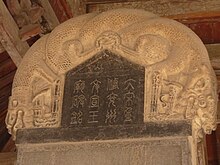Emperor Taizong of Song
According to official history, his succession was confirmed by Emperor Taizu on their mother Empress Dowager Du's deathbed as a result of her instruction.
A popular story dating back from at least the 11th century suggests that Emperor Taizong murdered his brother in the dim candlelight when the sound of an axe was allegedly heard.
He adopted the centralization policies of the Later Zhou, which include increasing agricultural production, broadening the imperial examination system, compiling encyclopaedias, expanding the civil service and further limiting the power of jiedushis.
It is rather unusual in Chinese history for a brother rather than the son to succeed the throne, so the event fueled popular belief that foul play was involved.
According to official history, Empress Dowager Du before her death in 961 asked the 34-year-old Emperor Taizu to promise that his brother would succeed him so as to ensure the continuation of the Song dynasty.
The so-called "Golden Shelf Promise" (金匱誓書) was also allegedly recorded and sealed, by secretary Zhao Pu and reopened after Emperor Taizong's succession to prove the latter's legitimacy.
Also suspicious is that Zhao Pu, banished in 973 by Emperor Taizu for allegations of corruption, returned to the capital in 976 and was made the chancellor in 977.
Palace eunuchs and maids standing in a distance saw that Emperor Taizong's shadow on the window moved a lot and appeared antsy.
This legend has been referred to as "sound of the axe in the shadow of the flickering candle" (斧声烛影) and proved to be popular to this day.
[5] Modern historians were unable to find any concrete evidence suggesting murder; however they generally accept that the "Golden Shelf Promise" was fraud fabricated by Emperor Taizong and Zhao Pu.
Also worth mentioning is the suicide of Zhao Dezhao, Emperor Taizu's eldest son, three years after his father's death.
According to this account, Zhao Dezhao immediately went to his palace and killed himself and when Taizong heard about the suicide, he was very sad and hugged the corpse crying.
Moreover, when Emperor Taizu's widow Empress Song died, her body was not buried with her late husband and not given the recognition according to tradition.
Emperor Taizong personally led the campaign against Northern Han in 979 and ordered the flooding of enemy cities by releasing the Fen River.
Having conquered Northern Han in 979, Emperor Taizong took advantage of the momentum and launched another military campaign against the Khitan-led Liao dynasty.
Concurrently, Liao reinforcements led by Yelü Xiuge arrived from the Gaoliang River region, west of Yanjing.
Amidst the onslaught, Emperor Taizong fled towards Yi Prefecture and arrived there safely with his generals protecting him.
He sustained an injury from an arrow and was unable to ride on his horse and had to travel by carriage back to Ding Prefecture.
Emperor Taizong's suspicions were raised when he heard that and eventually he ordered Zhao Dezhao to commit suicide.
The Battle of Gaoliang River was significant as it was one of the major contributing factors to the Song dynasty's decision to adopt a defensive stance.
[9] Yao attempted to complain to Taizong who said "Yuanjie is literate and enjoys learning; that should be sufficient to make him a worthy prince.
However, this time, Empress Dowager Xiao and Yelü Xiuge each led an army to support Zhuo Prefecture.
Emperor Taizong was aware that the failure of the East Army would affect the entire campaign and he ordered a retreat.
Yang Ye proposed that they should retreat since the East and Central Armies had already lost the advantage following their defeats.
With the rise of monopolies, local officials focused on collecting industrial and commercial taxes as a main daily duty.
During the Song dynasty, this led to a system where tax collection influenced rewards, punishments, and job status.


